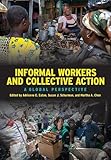Informal Workers and Collective Action : A Global Perspective / ed. by Susan J. Schurman, Adrienne E. Eaton, Martha A. Chen.
Material type: TextPublisher: Ithaca, NY : Cornell University Press, [2017]Copyright date: ©2017Description: 1 online resource (296 p.)Content type:
TextPublisher: Ithaca, NY : Cornell University Press, [2017]Copyright date: ©2017Description: 1 online resource (296 p.)Content type: - 9781501707964
- Employee rights
- Informal sector (Economics) -- Employees -- Labor unions -- Organizing
- Informal sector (Economics) -- Employees
- Labor movement
- General Economics
- Labor History
- Political Science & Political History
- POLITICAL SCIENCE / Labor & Industrial Relations
- collective action, informal workers, informal labor markets, vulnerable workers, social movements, labor organizing, case studies
- 331 23
- HD2341
- HD2341
- online - DeGruyter
| Item type | Current library | Call number | URL | Status | Notes | Barcode | |
|---|---|---|---|---|---|---|---|
 eBook
eBook
|
Biblioteca "Angelicum" Pont. Univ. S.Tommaso d'Aquino Nuvola online | online - DeGruyter (Browse shelf(Opens below)) | Online access | Not for loan (Accesso limitato) | Accesso per gli utenti autorizzati / Access for authorized users | (dgr)9781501707964 |
Frontmatter -- Contents -- Acknowledgments -- Introduction -- Part I. FORMALIZING OR REFORMALIZING DISTANCED EMPLOYMENT RELATIONSHIPS -- 1. Port Workers in Colombia -- 2. Retail and Hospitality Workers in South Africa -- 3. Haitian Migrant Workers in the Dominican Republic -- 4. Domestic Workers in Uruguay -- 5. Beer Promoters in Cambodia -- 6. Informalized Government Workers in Tunisia -- Part II. SECURING RECOGNITION AND RIGHTS FOR THE SELF-EMPLOYED -- 7. Minibus Drivers in Georgia -- 8. Waste Pickers in Brazil -- 9. Street Vendors in Liberia -- Conclusion -- Notes -- Notes on Contributors -- Index
restricted access online access with authorization star
http://purl.org/coar/access_right/c_16ec
Informal Workers and Collective Action features nine cases of collective action to improve the status and working conditions of informal workers. Adrienne E. Eaton, Susan J. Schurman, and Martha A. Chen set the stage by defining informal work and describing the types of organizations that represent the interests of informal workers and the lessons that may be learned from the examples presented in the book. Cases from a diverse set of countries—Brazil, Cambodia, Colombia, the Dominican Republic, Georgia, Liberia, South Africa, Tunisia, and Uruguay—focus on two broad types of informal workers: "waged" workers, including port workers, beer promoters, hospitality and retail workers, domestic workers, low-skilled public sector workers, and construction workers; and self-employed workers, including street vendors, waste recyclers, and minibus drivers.These cases demonstrate that workers and labor organizations around the world are rediscovering the lessons of early labor organizers on how to aggregate individuals' sense of injustice into forms of collective action that achieve a level of power that can yield important changes in their work and lives. Informal Workers and Collective Action makes a strong argument that informal workers, their organizations, and their campaigns represent the leading edge of the most significant change in the global labor movement in more than a century.ContributorsGocha Aleksandria, Georgian Trade Union ConfederationMartha A. Chen, Harvard University and WIEGO Sonia Maria Dias, WIEGO and Federal University of Minas Gerais, BrazilAdrienne E. Eaton, Rutgers, the State University of New JerseyMary Evans, Rutgers, the State University of New JerseyJanice Fine, Rutgers, the State University of New JerseyMary Goldsmith, Universidad Autónoma Metropolitana-XochimilcoDaniel Hawkins, National Trade Union School of ColombiaElza Jgerenaia, Labor and Employment Policy Department for the Ministry of Labour, Health and Social Affairs, Republic of GeorgiaStephen J. King, Georgetown UniversityAllison J. Petrozziello, UN Women and the Center for Migration Observation and Social DevelopmentPewee Reed, Ministry of Commerce and Industry, Republic of LiberiaSahra Ryklief, International Federation of Workers' Education AssociationsSusan J. Schurman, Rutgers, the State University of New JerseyVera Alice Cardoso Silva, Federal University of Minas Gerais, BrazilMilton Weeks, Devin Corporation
Mode of access: Internet via World Wide Web.
In English.
Description based on online resource; title from PDF title page (publisher's Web site, viewed 26. Apr 2024)


